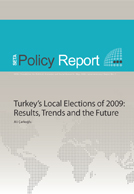Results
Results
Election Results in Bosnia and Herzegovina: Between Hope and Despair
| Domestic PolicyThere are many reasons to be hopeful about the election results in Bosnia and Herzegovina. After a very long time the Social Democratic Party (SDP) received the highest number of votes in the Bosniak-Croat Federation, and on the state level pulling in interethnic votes by re-electing Ivo Komsic, the Croat member of the Presidency. The election of Bakir Izetbegovic, the son of the legendary leader of the Bosniak independence movement, Alija Izetbegovic, is also a positive development. Bakir Izetbegovic is considered a moderate compared to the former Bosniak member of the Presidency, Haris Silajdzic, who regularly spoke of putting an end to Republika Srpska, further straining relations between Sarajevo and Banja Luka.
-
Domestic Policy
Turkey’s Local Elections of 2009: Results, Trends and the Future
By Ali ÇarkoğluThis article aims at presenting a descriptive account of the March 2009 local elections in Turkey. Comparing the general and local elections since 2004, an overall evaluation of trends in electoral preferences is presented. Using provincial general council election results, a detailed geographical comparative analysis of the 2004 and 2009 local elections is also carried out. The analyses show that the AKP’s rise has stalled but it still remains as the dominant power in the party system. The electoral map continues to be divided between the coastal western and most developed provinces where the opposition is significantly supported, the east and southeastern provinces where the Kurdish ethnic electoral support is rising and the more conservative provinces in between where the AKP continues to be dominant with the MHP trailing behind. Even though the March 2009 elections had all the characteristics of a local election, they also revel the rising trends in electoral behaviour in Turkey.










